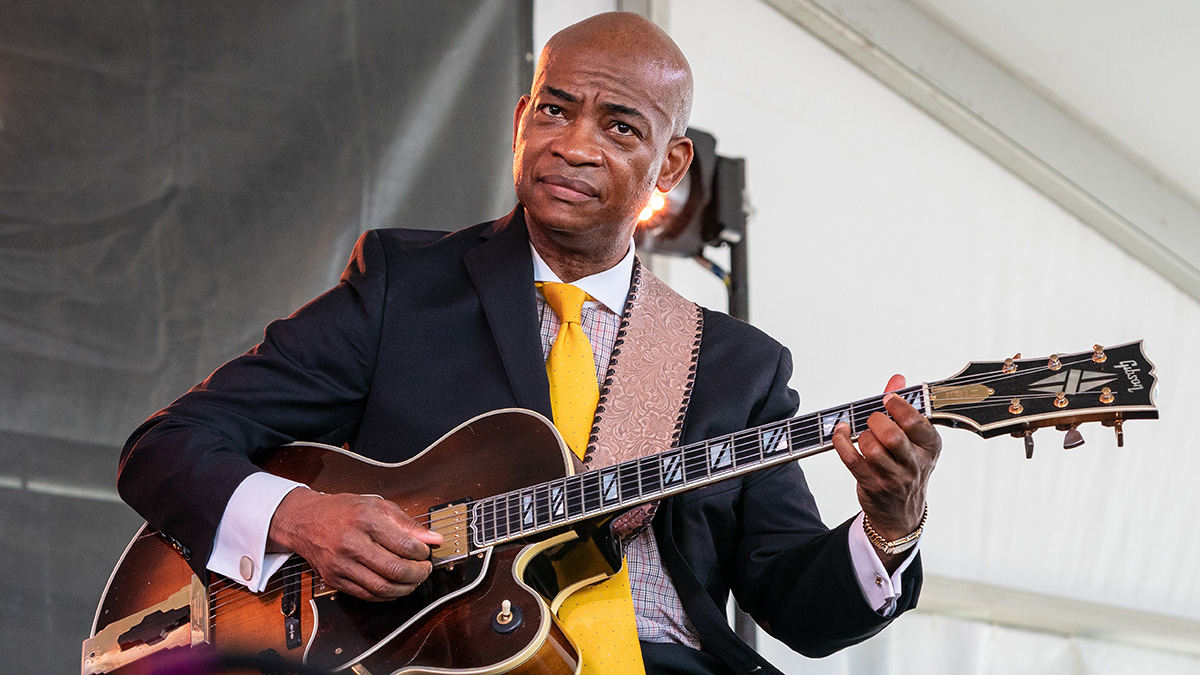“I love to swing, but I don't look down my nose at other styles of music, or other musicians. I'll play with anybody if the music is good”: Acclaimed jazz guitarist Russell Malone, known for his work with Harry Connick Jr. and Ron Carter, has died aged 60
Malone had just finished a performance at Blue Note Tokyo with The Golden Striker Trio when he suffered a fatal heart attack

Acclaimed jazz guitarist Russell Malone, best known for his work with Jimmy Smith, Diana Krall, and Harry Connick Jr., died suddenly in Tokyo on Friday August 23 at the age of 60. Malone had been touring Japan alongside pianist Donald Vega and double bassist Ron Carter as The Golden Striker Trio and had just finished a performance at Blue Note Tokyo when he suffered a fatal heart attack.
Carter broke the tragic news on social media, stating, “I am currently on a tour that began as The Golden Striker Trio, consisting of Russell Malone, Donald Vega, and Yours Truly. On the 23rd of August, Mr. Malone suffered a heart attack upon completion of our performance at Blue Note Tokyo. Donald Vega and I are completing this tour as a duo … in respect and honor of the memory of Mr. Malone … this is the chair Mr. Malone sat in to play and represents his continued presence on the bandstand with us.
“Thank you to all for your ongoing prayers and condolences, they are deeply appreciated. I will issue a statement when I can find the words. To the musical community at large, and the individuals contacting me for commentary for articles, Thank you for understanding that I need this time.”
Russell Malone was born in Albany, Georgia, on November 8, 1963. Throughout his career, he was highly esteemed for his versatility, able to accompany various singers and musicians while also carving out his niche as a bandleader and soloist.
He began playing guitar at the tender age of four, learning on a toy guitar that his mother had bought for him. Largely self-taught, he drew inspiration from artists such as B.B. King, The Dixie Hummingbirds, and George Benson, and managed to develop a soulful and instantly recognizable instrumental voice.
Fast-forward to 1985 and his move to Atlanta, where he built a reputation as a sideman with many respected jazz musicians at Walter Mitty's, a local club where musicians jammed after gigs. Starting in 1988, he spent two years working with Hammond B-3 legend Jimmy Smith, after which he spent three years with Grammy and Emmy winner Harry Connick Jr.
“I take pride in being open enough to play with anybody," said Malone in an interview with D'Addario. “I love to swing, but I don't look down my nose at other styles of music, or other musicians. I'll play with anybody, if the music is good.”
All the latest guitar news, interviews, lessons, reviews, deals and more, direct to your inbox!
In 1992, he signed with Columbia and subsequently released Black Butterfly, which continued to cement his status in the jazz and jazz fusion worlds. Three years later, Malone became Diana Krall's guitarist and played a seminal role in three Grammy-nominated albums, including the award-winning When I Look in Your Eyes.
The 1990s proved to be a busy period for Malone, as he also appeared in the Robert Altman movie Kansas City, recorded with pianist Benny Green, participated in Roy Hargrove's Crisol group, and sessioned for Kenny Barron, Branford Marsalis, Wynton Marsalis, Jack McDuff, and Mulgrew Miller, to name but a few.
In the 2000s, he recorded with bass legend Ray Brown, with whom he also performed as part of a trio with Monty Alexander, and released Playground (2004), Live at Jazz Standard, Volume One (2006), Live at Jazz Standard, Volume Two (2007), and Triple Play (2010) via jazz label MaxJazz. He joined Ron Carter's trio for the 2002 release The Golden Striker and regularly toured with that trio throughout the rest of his career.
Recent album releases include 2020's The Dream of You with Diana Krall and Trying Times with Deelee Dubé, as well as 2017's Time for the Dancers alongside pianist Rick Germanson, bassist Luke Sellick, and drummer Willie Jones III.
In an interview with Jazz Weekly, Malone shared his thoughts on why it's important to put a song's composition first. “I have seen guitar players try to accompany a singer and they are so busy trying to get their own thing on,” he said.
“In other words, they won't listen and they throw these different fancy harmonic substitutions in there and a lot of the stuff doesn't really make any sense. They are not listening to the lyric and I think you really have to listen.”
He continued, “You really have to pay attention and be able to serve the music. I think the same principle applies to instrumentalists also because you have to be able to trust each other.
“When you are playing with people that you trust and you have that element of trust there, you don't have to try to make anything happen. Everything will happen on the song. You just have to trust and listen and serve the music.”
Janelle is a staff writer at GuitarWorld.com. After a long stint in classical music, Janelle discovered the joys of playing guitar in dingy venues at the age of 13 and has never looked back. Janelle has written extensively about the intersection of music and technology, and how this is shaping the future of the music industry. She also had the pleasure of interviewing Dream Wife, K.Flay, Yīn Yīn, and Black Honey, among others. When she's not writing, you'll find her creating layers of delicious audio lasagna with her art-rock/psych-punk band ĠENN.



